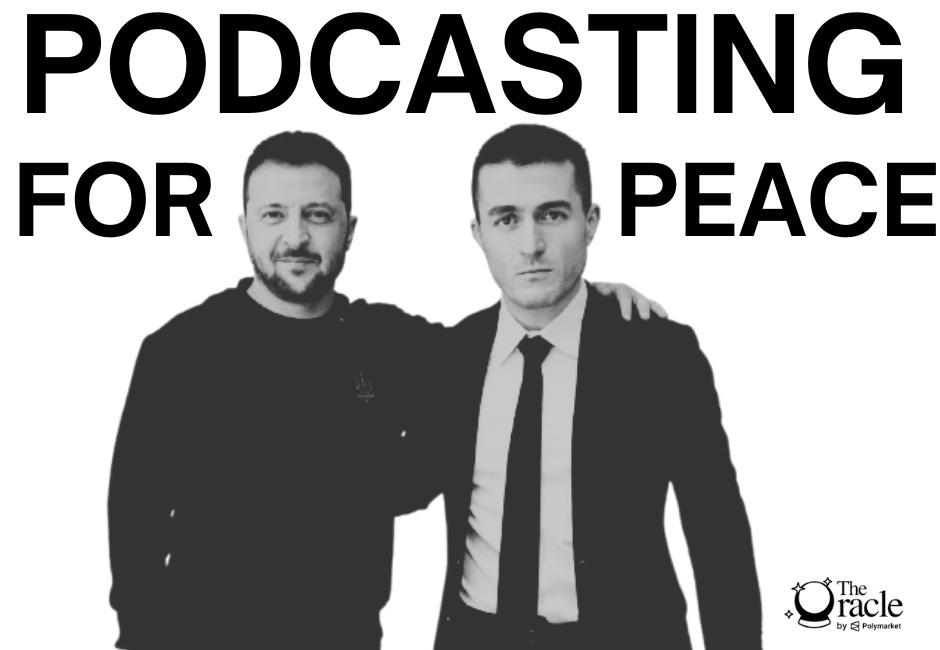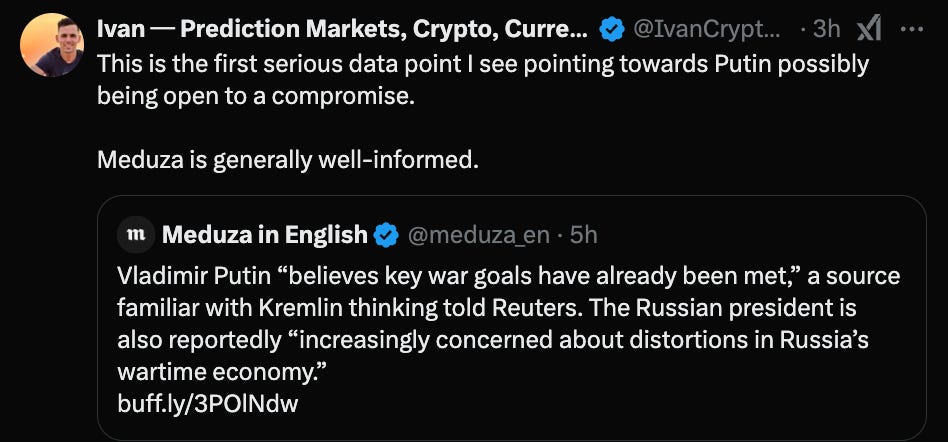🔮Podcasting for Peace
Can Lex Fridman End the Ukraine War on Stream?
After the election, we noticed that markets were showing better odds for a near-term peace deal in Gaza than in Ukraine. And it looks like this was exactly what played out.
Through a heavy dose of pressure applied by Israel envoy Steve Witkoff, Donald Trump scored a ceasefire and hostage deal in Gaza just as the Diet Coke button was returning to the Oval Office.
But now attention is shifting to Ukraine, a conflict that Trump said would be harder to crack than Gaza.
The odds for Trump to quickly score a peace deal in Ukraine hit peak optimism of ~50% after the election, but have fallen since.
Can Trump get a second quick foreign policy win?
On the Ground
The maps above show the war’s front lines on election day and now.
Highlighted in blue are areas of claimed Ukrainian advances around Russia’s Kursk Oblast. Ukraine is trying to expand its foothold in Russia amid reports (questioned by some) that 40% of the 10,000 North Korean troops sent to help Russia have been killed.
Russia is continuing to press in Eastern Ukraine with limited success, and Ukraine continues to hit deeper into Russia with Western weapons, striking oil refineries and other targets up to 1,000 km inside Russia.
Putin is also under pressure in the Middle East, following the collapse of Syria’s government in early December:
🔮 66% chance Russia abandons its Syrian naval base by July
🔮 33% chance Russia pulls out of Syria by April
The Playaz
As moves on the front lines grow smaller, is anyone ready to compromise?
Putin. Of the key actors, Putin has said the least about what concessions he is ready to make to end the war.
“We have always said that we are ready for negotiations and compromises,” Putin said recently, but when pressed, this seems to mean sticking to his early war demands, that:
Ukraine remain permanently "neutral" and out of NATO;
Severe limitations on the size of the Ukrainian military;
Removal of the current Ukrainian government.
One Oracle contributor noticed that Putin’s statements are starting to sound a lot like “mission accomplished.” Is this the first signal of an openness to ending the war?
Zelensky. Ukraine’s president has been on a media blitz aimed at keeping his country top of mind. He capped this off with a 3 hour Lex Fridman interview, in which Zelensky expanded on his demands for the West:
More arms shipments to deter Russia;
Security guarantees from NATO;
Western troops in Ukraine as peacekeepers;
Sanctions on Russian oil.
The odds for all of these happening are slim, (🔮 8% odds Ukraine joins NATO in 2025). Zelensky seems to be coming out of the gate with maximal demands that he expects to be negotiated back.
The podcast had some tense moments, with Lex pressing Zelensky to respect Putin and speak in Russian. But props to Fridman for being the first podcaster trying to negotiate an international peace deal on stream – and he’s coming for Putin next: 13% chance he appears on the Lex podcast by March.
Trump. During the campaign, Democrats played the “Trump will abandon Ukraine” card – but so far this is not happening. Trump has promised an end to the war, but so far has been short on details.
A Truth Social post yesterday gave us the clearest window into Trump’s thinking, and surprised many observers by seeming to put more pressure on the Russians than the Ukrainians:
Trump’s Cabinet
Trump is famously not a details guy, so it’s also worth looking at what his top foreign policy picks are saying:
Pete Hegseth (🔮 95% confirmation odds). Hegseth’s confirmation hearings came before Trump’s recent post, so it’s possible Hegseth was in the dark on Trump’s feelings about Ukraine.
Hegseth didn’t mention Ukraine at all in his opening statement, and said the bare minimum when pressed by Senator Austin King. This seems to suggest that Hegseth does not have much of an independent take on Ukraine and was waiting to see what developed from his boss.
Marco Rubio Rubio’s pick as Secretary of State was taken as a strong signal that a Ukraine bus-throw was not imminent. His latest statements were critical of Biden’s open-ended support for Kiev, but also recognizing that the conflict as a stalemate that requires pressure on both sides to end.
Tulsi Gabbard (🔮 70% confirmation odds). Although she has been quiet on Ukraine lately, Tulsi Gabbard, is the biggest Ukraine skeptic in Trump’s cabinet in-waiting. She called on Ukraine to remain neutral and for the US to respect Russian interests, stances that led to her opponents accusing her of being a Russian asset.
Gabbard’s confirmation odds of 65% make her the most tenuous of all Trump’s picks, and a recent report suggested that at least one Republican senator doubts she will make it through the committee process.
Scott Bessent (🔮 99% confirmation odds): The Treasury Secretary will be another key player in Russia policy, and, unlike Hegseth, came out swinging in his confirmation by calling for tighter financial sanctions on Russia and its oil industry. This policy was mentioned in Trump’s Truth Social post, suggesting that Trump may be looking to lean into economic tools as his opening move.
Bottom Line
While odds for a Ukraine deal are only 33% within Trump’s first three months in office, odds for a deal this year have been trending upwards and now sit at 66% for a meaningful ceasefire this year.
The front lines are frozen but we may be seeing an outline of a Trump administration plan to use financial and oil sanctions to increase economic pressure on Russia to come to the bargaining table.
There’s a 53% chance of a Trump-Putin meeting in the first 100 days, which — given Trump’s preference for in-person deal making — will be an important market to watch going forward.
Connect With The Oracle
Tips? Feedback? Story ideas? Write oracle@polymarket.com or @wasabiboat on X
We’re On X: Follow The Oracle for updates
Write for The Oracle: We’re expanding our coverage and looking to hire more writers and investigators. Details Here.
Disclaimer
Nothing in The Oracle is financial, investment, legal or any other type of professional advice. Anything provided in any newsletter is for informational purposes only and is not meant to be an endorsement of any type of activity or any particular market or product. Terms of Service on polymarket.com prohibit US persons and persons from certain other jurisdictions from using Polymarket to trade, although data and information is viewable globally.










